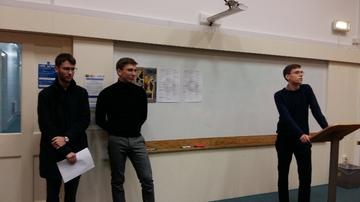Between the 28th and 29th February 2020 the Oxford University Byzantine Society hosted its 22nd international graduate conference at the History Faculty. Entitled ‘The State Between: Liminality, Transition and Transformation in Late Antiquity and Byzantium’, the conference invited speakers from over 20 countries to apply the framework of liminality to their research. Over the two days, students and academics fought through the cold, rain and hail to listen to papers covering diverse aspects of the Late Antique and Byzantine world.
Originally used by anthropologists to describe rites of passage, the concept of liminality has since been successfully adopted by scholars from a range of disciplines. Viewing the Late Antique and Byzantine world through the lens of liminality brings to the foreground aspects of ‘in-betweenness’, emphasising fluidity and dynamism rather than discrete categorisation. Such an approach lends itself particularly well to Late Antique and Byzantine studies, given the field’s interdisciplinary character and its extraordinary resilience to simplistic definition.
One of the strongest facets of this year’s conference was the extent to which its participants engaged with the theme in a sophisticated and creative way. One session, whose geographical focus ranged from Iceland to central Eurasia to China, illustrated the global scope of Byzantine studies as well as the immense value of comparative approaches. The emphasis on liminality as an interpretative framework also encouraged interdisciplinary discussion as papers were delivered by specialists in diverse fields, from Late Antique Theology to Medieval Georgian Art. These sessions are representative of the very high quality of the papers throughout the conference, many of which led to keen discussion both inside and outside the seminar room.

Behind the scenes, the many mundane but crucial tasks required to keep the conference running were carried out by a small dedicated group of student volunteers. These ranged from assembling and handing out conference packs to attendees, to arranging college accommodation for speakers and chairing sessions. The outbreak of COVID-19 in Italy presented an additional challenge for the organisation of the conference this year. Thankfully some speakers were able to give their papers remotely, and those present showed considerable patience and understanding as adjustments were made to the conference timetable.
The immediate impact of the conference has been quantifiable to a certain extent. Speakers engaged with the conference feedback collection process which will be used to shape the event’s organisation in future years. A volume of selected proceedings will also be prepared for publication. This will provide speakers with an excellent opportunity to hone their arguments and respond to the feedback of their peers. Above all, it is hoped that the connections formed between speakers will blossom into a supportive and multidisciplinary community of postgraduate scholars. Networks such as these are more crucial than ever when facing the challenges of these uncertain times.
The conference was organised by Daniel Gallaher, Josh Hitt, Lorenzo Saccon and Katerina Vavaliou, with support from The Oxford Centre for Byzantine Research, The Oxford Centre for Late Antiquity, Oxford Medieval Studies, The Arts and Humanities Research Council, The Oxford Research Centre for Humanities, and The Society for the Promotion of Byzantine Studies.
For more information, please visit https://oxfordbyzantinesociety.wordpress.com/
Follow the Oxford University Byzantine Society on Twitter @oxbyz
Image Credits:
[1] Background Photo: Mosaic of Theodora – Basilica of San Vitale (Ravenna, Italy) © Petar Milošević / CC BY-SA; Graphic Design: Katerina Vavaliou for the OUBS.
[2] Katerina Vavaliou for the OUBS.